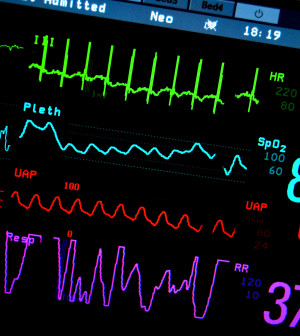- Could Your Grocery Store Meat Be Causing Recurring UTIs?
- Are You Making This Expensive Thermostat Error This Winter?
- Recognizing the Signs of Hypothyroidism
- 10 Strategies to Overcome Insomnia
- Could Artificial Sweeteners Be Aging the Brain Faster?
- Techniques for Soothing Your Nervous System
- Does the Water in Your House Smell Funny? Here’s Why
- Can a Daily Dose of Apple Cider Vinegar Actually Aid Weight Loss?
- 6 Health Beverages That Can Actually Spike Your Blood Sugar
- Treatment Options for Social Anxiety Disorder
Study Links Psychiatric Disorders to Stroke Risk

Getting care at a hospital for a psychiatric disorder may be linked to a higher risk of stroke in the following weeks and months, new research suggests.
People who sought care at a hospital for serious mental health conditions — such as depression, anxiety or post-traumatic stress disorder — faced a tripled risk of stroke following their visit, the study authors contended.
The risk started to decrease after 30 days, but remained twice as high for at least a year after the ER visit or hospital stay, the researchers said.
“We have known for some time that people who have a stroke seem to be at an increased risk for later on developing some sort of psychiatric illness, depression or post-stroke psychosis,” said study lead author Jonah Zuflacht. He’s a fourth-year medical student at Columbia University’s College of Physicians and Surgeons in New York City.
“But what has been less studied is the inverse of that. Meaning, if you have some sort of psychiatric illness, does it increase the risk for stroke?” he added.
“And what we found is that if you are hospitalized for some sort of mental illness, your risk of stroke is increased, and it’s most increased over the two-week period following your hospitalization,” Zuflacht said.
It’s important to note that the study wasn’t designed to prove a cause and effect; it only found that an ER visit or hospitalization for a psychiatric disorder was associated with a higher risk of stroke.
“As to why, we have theories, but they’re only theories,” Zuflacht said. “At this point we’re not really able to offer a clear explanation as to why that is the case.”
The researchers said they suspect that serious psychiatric illness may send the body’s “fight-or-flight” stress response into overdrive. One reaction this might cause is elevated blood pressure, and high blood pressure is a leading cause of stroke.
“The other possibility is that there are behavioral reasons at work,” Zuflacht said. “For example, are these patients maybe not taking the medications they should be taking to prevent a stroke — like their high blood pressure meds — because of their mental illness? We don’t yet have the data to support either theory, but these are our hypotheses.”
Nonetheless, the findings suggest that patients being treated for depression or other psychiatric illnesses may be vulnerable to stroke, Zuflacht said.
“Maybe down the road these patients could benefit from primary prevention strategies for stroke, like prescribing daily aspirin, for example. Of course, whether or not that would help and be of benefit we can’t yet say,” he added.
The study data came from California’s Healthcare Cost and Utilization Project. The researchers analyzed more than 52,000 stroke “events” — equally divided between men and women — that had taken place between 2007 and 2009.
The researchers found that more than 3,300 patients — just over 6 percent — had sought hospital care for a psychiatric disorder at some point in the year leading up to their stroke.
These patients were more likely to be female. They also tended to need a longer hospital stay for their stroke treatment, compared with stroke patients who hadn’t sought mental health care at a hospital.
The risk of stroke more than tripled within the first 15 days after receiving mental health care. The risk dropped slightly immediately afterwards, but was still more than triple the norm one month out, the study authors said.
And though it fluctuated over the following months, the risk was still more than double the norm through the 12-month mark.
Dr. Larry Goldstein, a spokesman for the American Stroke Association, said what this study adds “is the tantalizing possibility that interventions aimed at reducing psycho-social stress may also translate, potentially, into a reduction in stroke risk.”
But right now, that’s only a hypothesis that needs to be tested, he said.
Zuflacht and his colleagues are scheduled to present their findings on Thursday at the International Stroke Conference in Houston. Until published in a peer-reviewed journal, findings presented at meetings are generally viewed as preliminary.
More information
There’s more about stroke risk at the American Stroke Association.
Source: HealthDay
Copyright © 2026 HealthDay. All rights reserved.










